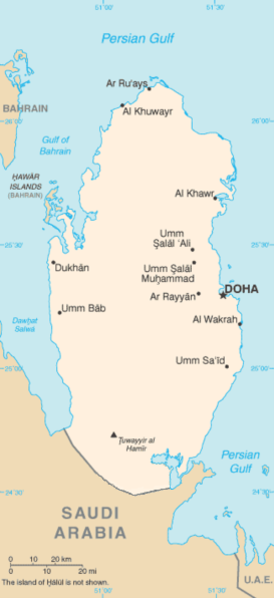 Qatar (Arabic: قطر Qaṭar; IPA: [ˈqɑtˁɑr], local pronunciation: [ɡitˁar]), officially the State of Qatar (Arabic: دولة قطر transliterated as Dawlat Qatar), is an Arab emirate in Southwest Asia, occupying the small Qatar Peninsula on the northeasterly coast of the larger Arabian Peninsula. It is bordered by Saudi Arabia to the south; otherwise the Persian Gulf surrounds the state.
Qatar (Arabic: قطر Qaṭar; IPA: [ˈqɑtˁɑr], local pronunciation: [ɡitˁar]), officially the State of Qatar (Arabic: دولة قطر transliterated as Dawlat Qatar), is an Arab emirate in Southwest Asia, occupying the small Qatar Peninsula on the northeasterly coast of the larger Arabian Peninsula. It is bordered by Saudi Arabia to the south; otherwise the Persian Gulf surrounds the state.
FACTS
Capital Doha
25°18′N 51°31′E / 25.3, 51.517
Official languages Arabic
Demonym Qatari
Government Absolute Monarchy
- Emir HH. Sheikh Hamad bin Khalifa Al Thani
- Prime Minister Hamad bin Jassim bin Jaber Al Thani
Independence1
- current ruling family came to power December 18, 1878
- independence from the United Kingdom September 3, 1971
Area
- Total 11,437 km2 (164th) / 4,416 sq mi
- Water (%) negligible

Population
- October 2008 estimate 1,541,130
- 2004 census 744,029[6] (159th)
- Density 74/km2 (121st) / 192/sq mi
GDP (PPP) 2008 estimate
- Total $95.130 billion
- Per capita $86,669
GDP (nominal) 2008 estimate
- Total $116.851billion
- Per capita $106,459
HDI (2007) ▲ 0.875 (high) (35th)
Currency Riyal (QAR)
Time zone AST (UTC+3)
- Summer (DST) (not observed) (UTC+3)
Drives on the right
Internet TLD .qa
Calling code 974
EDUCATION
Along with the country’s free healthcare, citizens enjoy free education from kindergarten through to high school. Qatar University was founded in 1973. More recently, with the support of the Qatar Foundation, some major American universities have opened branch campuses in Education City, Qatar. These include Carnegie Mellon University, Georgetown University School of Foreign Service, Texas A&M University, Virginia Commonwealth University, Cornell University’s Weill Medical College and Northwestern University. In 2004, Qatar established the Qatar Science & Technology Park at Education City to link those universities with industry. Education City is also home to a fully accredited International Baccalaureate school, Qatar Academy. Two Canadian institutions, the College of the North Atlantic and the University of Calgary, also operate campuses in Doha.
Moreover, Stenden University Qatar (Former CHN University of Professional Education) has been around in Doha for 8 years. It offers four year bachelor degree programs (BBA) in International Hospitality Management, International Business & Management Studies, and Tourism Management. It is a Dutch university and its programs are fully accredited by Ministry of Education, Qatar.
In November 2002, the Emir Hamad bin Khalifa al-Thani created the Supreme Education Council. The Council directs and controls education for all ages from the pre-school level through the university level, including the “Education for a New Era” reform initiative.
The Emir’s second wife, Her Highness Sheikha Mozah Bint Nasser Al-Missned, has been instrumental in new education initiatives in Qatar. She chairs the Qatar Foundation, sits on the board of Qatar’s Supreme Education Council, and is a major driving force behind the importation of Western expertise into the education system, particularly at the college level.
Her Highness Sheikha Mozah Bint Nasser Al-Missned

Her Highness Sheikha Mozah bint Nasser Al Missned has been actively engaged in education and social reform in Qatar for many years and has played a major role in spearheading various national and international development projects. For further details, please go to
http://www.mozahbintnasser.qa/
Qatar Foundation
Founded in 1995 by His Highness Sheikh Hamad Bin Khalifa Al Thani, Emir of Qatar, and chaired by Her Highness Sheikha Mozah Bint Nasser Al Missned, Qatar Foundation is a private, non-profit organization committed to the principle that a nation's greatest natural resource is its people.
The headquarters of Qatar Foundation are located within its flagship project, Education City, a fourteen million square-meter campus which hosts numerous progressive learning institutions and centers of research, including branch campuses of six of the world's leading universities, plus a cutting-edge research and development center. Qatar Foundation also works to enhance the quality of life in Qatar by investing in community health and development. For more information please visit:
http://www.qf.org.qa/.
Qatar Science & Technology Park (QSTP)
Qatar Science & Technology Park (QSTP) brings research and business together to support the country's development of a sustainable, knowledge-based economy - a process in which Qatar Foundation plays a leading role.
The role of QSTP is to support international companies, institutes and entrepreneurs to develop cutting-edge technologies in Qatar, and to foster their partnership with the renowned universities at Qatar Foundation's Education City.
An artists impression of the new QSTP premises due to open in early 2009.
The science park provides an ideal environment for technology business: research-friendly buildings, commercialization support programs, free-trade zone incentives, and the commitment of Qatar's senior leadership. It is also an incubator for start-up ventures, helping to commercialize the fruits of Qatar's strong investment in research and development.
QSTP's new $300 million facilities open mid 2008. ConocoPhillips, ExxonMobil, Shell and Total are establishing research and training centers that add value to Qatar's hydrocarbons sector; local software company iHorizons joins Microsoft and Cisco in developing new IT applications; EADS and GE are at the forefront of industrial technologies; SMARD is Qatar's first bio medical research company; and Gartner Lee is specializing in environmental management.
QSTP is co-located at Education City with universities of some of the world's most famous research-based universities. Companies at the science park are forming research and education partnerships with the institutes.
The outcomes of this collaboration will be new technology-based enterprises that will help diversify Qatar's economy, and will provide exciting career opportunities for the country's bright young scientists and engineers. By partnering with world-leading corporate and academic research teams, QSTP will also be a base for platform technologies that will underpin the growth of knowledge industries in Qatar for years to come.
For more information on Qatar Science & Technology Park, please visit
www.qstp.org.qa
Sidra Medical and Research Center
Located in Education City and due to open in 2011, Sidra will incorporate the most sophisticated digital technology in all areas - from administrative functions to the assembly and application of genetic coding in advanced scientific research.
Sidra's specialization will be women's and children's health, but it will offer select medical and surgical services for all adults. The facility will also focus on diabetes, cardiovascular disease, obesity and other illnesses.
Sidra will serve as a premier teaching venue for Weill Cornell Medical College in Qatar, and it will help establish the nation as a leader in the creation of scientific knowledge through its biomedical research center. Translational and clinical research will begin prior to Sidra's opening through partnerships with WCMC-Q and Hamad Medical Corporation, the country's major public health provider. The translational research agenda will encompass pregnancy health and infertility, women's health and developmental and preventive medicine. The clinical portfolio will include medical devices, diagnostics, drugs and vaccines.
Qatar Foundation has committed $7.9 billion USD to Sidra the largest cash endowment of a medical center anywhere in the world. Construction will begin in 2008.
For more information and ongoing updates about Sidra Medical and Research Center, visit
www.sidra.org.
RESEARCH PROGRAMS AT UNIVERSITIES
Research and teaching are integrated to a large degree in the Education City universities. Students are introduced to research methodologies by their teachers and work closely with them on individual and group projects.
Student researchers have benefited from The Qatar National Research Fund's
Undergraduate Research Experience Program, and more recently a number of major awards have been granted at faculty level through the National Priorities Research Program.
Particular emphasis is placed on research that will be of clear benefit to the State of Qatar. In many cases, it is being carried out in concert with local organizations - something that will encourage the development of an indigenous research culture.
Texas A & M University at Qatar
Carnegie Mellon University in Qatar
Georgetown University
Virginia Commonwealth University in Qatar
Weill Cornell Medical College in Qatar
Faculty Of Islamic Studies
North Western University of Qatar
| Web site for His Highness Sheikh Hamad Bin Khalifa Al-Thani and the Government of Qatar. |
| |
| Government web site outlining Qatar's foreign policy. |
| |
| Official Government web site for education. |
| |
| Web site providing information on Qatar's program of education reform. |
| |
| Government ministry for home affairs. |
| |
| Information about Islam in Qatar. |
| |
|
| The Official web site of the Planning Council of Qatar |
|
| Web site for the organization providing healthcare and learning support for people with special needs in Qatar. |
| |
| Home page of the organization which promotes educational, social and technological advancement in Qatar. |
| |
| Information about the Qatar campus of Cornell University. |
| |
| Web site for the research and development organization with a branch in Education City. |
| |
| Details about the business and computer science programs available in Education City. |
| |
| Information about the engineering degree programs on offer in the university's Education City campus. |
| |
| VCU School of the Arts in Qatar |
| |
| Outline of design courses offered by Virginia Commonwealth University in Education City. |
| |
| Web site of Qatar's public university. |
| |
|
| Provides training courses and administrative studies. |
| |
|
| Information about Qatar as a destination for visitors and business. |
| |
| Web site for the national corporation responsible for oil and gas industry processes in Qatar. |
| |
| The Official Site of Foreign Information Agency of the State of Qatar. |
| |
| Concerns about the Cultural, Artistic and Heritage movements in Qatar. |
| |
| Official web site of Qatar National Olympic. |
























 Her Highness Sheikha Mozah bint Nasser Al Missned has been actively engaged in education and social reform in Qatar for many years and has played a major role in spearheading various national and international development projects. For further details, please go to
Her Highness Sheikha Mozah bint Nasser Al Missned has been actively engaged in education and social reform in Qatar for many years and has played a major role in spearheading various national and international development projects. For further details, please go to